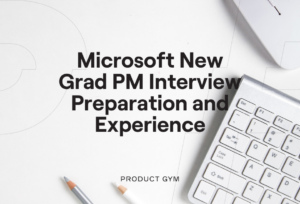In an interview with an internal recruiter, it’s important to be sharp and smart in your answers to their questions. There will be some topics that will be critical for you and/or the interviewer to determine if you are right for the job and worthy of being hired. Those topics are critical for interviewers and companies to paint a description based on their perspective of you as the applicant.
These questions and topics will often be very personal and are going to be hard to answer. While it may seem ironic for personal questions to become the hardest questions to be answered, recruiters and interviewers expect the applicant to be in-depth in their answers and replies.
These questions and topics will be a mainstay in first or second-round interviews, so there’s no avoiding them. Product Gym has listed these essential topics that are basic and seemingly easy to answer but are still important for applicants to spend time on their answers.
1. Your Role Minus the Technical Jargon
You want to avoid talking about the company that you’re working for and focus on talking about yourself or your role. Almost everyone makes this mistake because again, you are comfortable talking about what the company does right now but uncomfortable talking about your role. You have to talk about yourself and your role. It honestly does not matter what the company does.
Suppose Chris does ad tech; Tabula does native ads placement.
You don’t have to go into what native means. You don’t have to go into CPM. You don’t have to go into analytics. You don’t have to go into the tools.
Only go into it if it is relevant to your role. Tell them that this is an ad company that does native ad placement, which is all they need to know. If they want to know more, they will ask. Therefore, you should spend the majority of the time focusing on yourself and only add context if it’s product-centric.
Going back to the last example, let’s assume Chris is an account manager.
What is relevant about that role that is product-centric?
I was understanding and built customer empathy.
That is one of the key traits of the role. Focus on that.
How did you do it?
I was talking to all these people and documenting requirements. Eventually one of the key pain points that I found was they were not maximizing XYZ.
That is what you want to focus on during these calls. Do not get too technical and mention a bunch of different terms. For example, even though you may come from a finance background, we can guarantee you that many of these people do not have finance background. Therefore, if you start going into detail about that, then recruiters are going to be completely lost.
A lot of these calls start off great, but near the end, they tend to lose momentum. You need to have energy. We understand that it is a pain to apply to all these companies which you may not be the most enthusiastic about, but you have to sound energetic if you wish to advance to the second round. I know Product Managers who have done second-round calls and discount candidates because they don’t have energy. You must have energy and you can not sound bored.
Last but not least are the “uhms and aah’s”, which will only go away with practice. The best way to force yourself away from saying these is if you listen to your calls and literally start counting them. You are going to feel horrible about it, which is great. You will only get better at interviewing.
2. Your Reason for Leaving
A lot of people are deviating from this on the calls. You have to give him an undeniable committed reason. Some examples may be:
I’m looking to leave my current role because my fiancée is starting school there.
I’m looking to leave my current role because I have to take care of my family there.
You have to sign a committed reason, otherwise, they are going to discount you. You are going to be pushed out of the ladder by people who will make it to the second or third round.
Imagine this scenario:
Two recruiters are choosing between two candidates, and one of them says,
Between William the Great and Chris the Great, I do not know who to choose.
Well, if they are equally great, who is more likely to take the offer if we give it to them? The other recruiter then says,
Well, this person’s fiancée is starting school, and I know for a fact he is not going to leave his fiancee.
Therefore, they are going to give the offer to that person.
You can also give a systemic reason. To name a few:
It is slow, toxic, the industry is changing, the company has changed since I joined, I don’t see my manager enough, there is no room for growth, culture has changed, etc. The list goes on.
You do not want to say that your current role is too easy or too hard. This just means that you are weak. Because when the recruiter hears that, and you say anything along the lines of “I am not really being challenged by my work”. Don’t say anything along those lines. Keep the reason as something that is systemic.
3. Your Mission
Lastly, you have to sell them on the mission and the scope of work. For example,
I love real estate CRM because my family has been in real estate for eighteen generations, and I really believe in making the lives easier.
The scope of work might be:
I have been working with B2B enterprise stakeholders for a very long time, and I am looking to pivot into more B2C. My current project is more B2C, and I am finding that there are no other B2C opportunities in my organization. I want to move to an organization that will allow me to utilize these skills.
Whatever it is, you have to focus on these three points. Give them an undeniable reason for why you are leaving, and also give them a reason for why you want to go to that industry.
You can always tether it to something more unchangeable and more systemic with however large or small companies are. For example, you can say that the changing culture has worked well with all your stakeholders, but you are starting to realizing that the culture is becoming too bureaucratic. If you are currently in a small company and want move to a large company, you can say that you are looking for a little more stability.
At Product Gym, we make sure that you are well-prepared to master your product management interview. We show you how to ace every single question in your Product Manager interview, from behavioral and technical questions to case studies and salary negotiation.
In fact, we’re currently offering free coaching sessions with our in-house Product Manager training experts.
If you are looking to nail your interview with our tried-and-tested methodology that helps you stand out from the crowd and leave a lasting impression on your recruiter, schedule a free coaching session with us today.
Please schedule a call today or RSVP for our next event to see how Product Gym can help you land your next Product Manager job.



